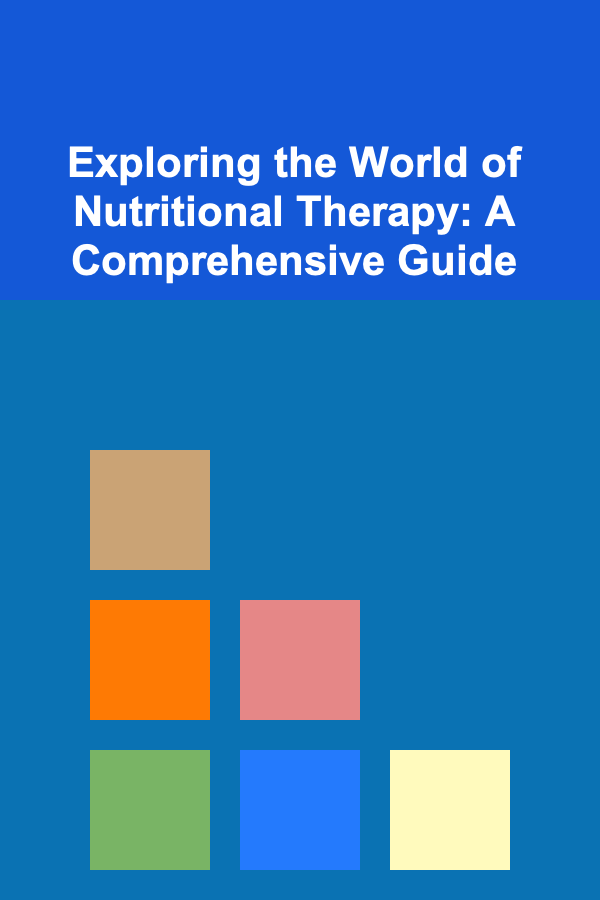
Exploring the World of Nutritional Therapy: A Comprehensive Guide
ebook include PDF & Audio bundle (Micro Guide)
$12.99$11.99
Limited Time Offer! Order within the next:

Nutritional therapy, at its core, is the application of nutrition science to promote health, peak performance, and individual care. It recognizes that food isn't just fuel; it's information that interacts with our genes, biochemistry, and ultimately, our overall well-being. This holistic approach seeks to identify and address the root causes of health imbalances through personalized dietary and lifestyle interventions. Unlike conventional medicine, which often focuses on symptom management, nutritional therapy aims to support the body's innate healing capabilities. This in-depth exploration will guide you through the multifaceted world of nutritional therapy, covering its principles, scope, applications, career paths, and potential benefits and limitations.
Understanding the Foundations of Nutritional Therapy
Nutritional therapy rests on several fundamental principles:
- Biochemical Individuality: Acknowledges that each person is unique, with distinct genetic predispositions, environmental exposures, and lifestyle factors that influence their nutritional needs. What works for one individual may not work for another. A nutritional therapist will delve into a client's history to create truly tailored advice.
- Food as Medicine: Emphasizes the profound impact of food on health. Foods can provide essential nutrients, support immune function, reduce inflammation, and regulate various bodily processes. The focus is on nutrient-dense whole foods, minimizing processed foods and refined sugars.
- Addressing Root Causes: Seeks to identify and address the underlying causes of health issues rather than simply masking symptoms. This may involve investigating digestive problems, hormonal imbalances, nutrient deficiencies, or environmental toxins. For example, if a client presents with fatigue, a nutritional therapist will look beyond simply recommending caffeine and investigate potential causes such as iron deficiency, adrenal fatigue, or poor gut health.
- Holistic Approach: Considers the interconnectedness of the body and the influence of lifestyle factors on health. This includes stress management, sleep hygiene, physical activity, and environmental exposures. Nutritional therapists understand that diet is only one piece of the puzzle.
- Empowering the Individual: Nutritional therapy aims to empower individuals to take control of their health through education and self-care practices. Clients are actively involved in the process, learning about their bodies and how to make informed choices.
The Scope and Applications of Nutritional Therapy
The applications of nutritional therapy are wide-ranging and can address a variety of health concerns. While not a replacement for conventional medical care, it can be a valuable adjunct therapy, working in conjunction with other healthcare professionals. Here are some key areas where nutritional therapy can be beneficial:
Digestive Health
Gut health is increasingly recognized as a cornerstone of overall well-being. Nutritional therapy can help address a range of digestive issues, including:
- Irritable Bowel Syndrome (IBS): Identifying trigger foods, managing stress, and supporting gut microbiome balance through dietary changes and supplementation. This might involve implementing a low-FODMAP diet, identifying sensitivities through elimination diets, or recommending probiotics and prebiotics.
- Inflammatory Bowel Disease (IBD): Reducing inflammation, supporting nutrient absorption, and managing symptoms through tailored dietary strategies. Working with IBD requires a very cautious and individualized approach.
- Small Intestinal Bacterial Overgrowth (SIBO): Implementing dietary strategies to reduce bacterial overgrowth and support gut healing. This could involve a specific diet alongside antimicrobial herbs under careful supervision.
- Food Sensitivities and Allergies: Identifying and eliminating trigger foods through elimination diets and food sensitivity testing. Nutritional therapists help clients navigate the challenges of managing food sensitivities and ensuring adequate nutrient intake.
Hormonal Balance
Hormones play a crucial role in regulating various bodily functions, and imbalances can lead to a wide range of health problems. Nutritional therapy can support hormonal balance by:
- Supporting Thyroid Function: Providing nutrients essential for thyroid hormone production, such as iodine, selenium, and zinc. Addressing underlying factors that may be contributing to thyroid dysfunction, such as stress and inflammation.
- Managing Polycystic Ovary Syndrome (PCOS): Improving insulin sensitivity, regulating blood sugar levels, and supporting healthy ovulation through dietary changes and supplementation. This often involves a low-glycemic index diet, regular exercise, and stress management techniques.
- Easing Menopause Symptoms: Managing hot flashes, mood swings, and sleep disturbances through dietary adjustments and herbal remedies. Focusing on phytoestrogens and nutrients that support bone health.
- Supporting Adrenal Function: Reducing stress, improving sleep quality, and providing nutrients that support adrenal gland function. This could involve adaptogenic herbs and a focus on stabilizing blood sugar levels.
Weight Management
Nutritional therapy offers a sustainable and personalized approach to weight management, focusing on long-term health rather than quick fixes. This involves:
- Promoting Healthy Eating Habits: Encouraging the consumption of whole, unprocessed foods and reducing intake of refined sugars, processed fats, and unhealthy additives.
- Balancing Macronutrients: Optimizing the intake of protein, carbohydrates, and fats to support satiety, energy levels, and metabolic function.
- Addressing Underlying Metabolic Issues: Identifying and addressing factors that may be contributing to weight gain, such as insulin resistance, hormonal imbalances, and thyroid dysfunction.
- Mindful Eating: Encouraging mindful eating practices to promote awareness of hunger and fullness cues and reduce overeating.
Energy and Fatigue
Persistent fatigue can significantly impact quality of life. Nutritional therapy can help identify and address the underlying causes of fatigue, such as:
- Nutrient Deficiencies: Identifying and correcting deficiencies in essential nutrients, such as iron, vitamin B12, and vitamin D. Testing may be required to identify deficiencies.
- Adrenal Fatigue: Supporting adrenal gland function through stress management, sleep hygiene, and dietary adjustments.
- Mitochondrial Dysfunction: Supporting mitochondrial function through targeted nutrients and antioxidants. Mitochondria are the powerhouses of our cells, and their proper function is critical for energy production.
- Food Sensitivities: Identifying and eliminating food sensitivities that may be contributing to inflammation and fatigue.
Mental Health
The connection between diet and mental health is increasingly recognized. Nutritional therapy can support mental well-being by:
- Supporting Brain Health: Providing nutrients essential for brain function, such as omega-3 fatty acids, B vitamins, and antioxidants. Focusing on foods that support neurotransmitter production.
- Balancing Blood Sugar Levels: Stabilizing blood sugar levels to prevent mood swings and improve cognitive function. Avoiding refined carbohydrates and sugary drinks.
- Supporting Gut-Brain Axis: Promoting a healthy gut microbiome, which plays a crucial role in regulating mood and behavior. This involves consuming probiotic-rich foods and prebiotics.
- Reducing Inflammation: Reducing inflammation in the brain, which is linked to various mental health conditions. This involves a diet rich in antioxidants and anti-inflammatory foods.
Chronic Disease Prevention
Nutritional therapy plays a vital role in preventing and managing chronic diseases, such as:
- Heart Disease: Lowering cholesterol levels, reducing blood pressure, and improving blood sugar control through dietary changes and lifestyle modifications.
- Type 2 Diabetes: Improving insulin sensitivity, regulating blood sugar levels, and managing weight through dietary strategies and exercise.
- Cancer: Supporting immune function, reducing inflammation, and providing nutrients that may help prevent and manage cancer. This involves a diet rich in antioxidants and phytochemicals.
- Autoimmune Diseases: Reducing inflammation, supporting immune function, and managing symptoms through tailored dietary approaches. This often involves identifying and eliminating potential trigger foods.
The Role of a Nutritional Therapist: Skills, Education, and Ethics
A qualified nutritional therapist possesses a unique blend of knowledge, skills, and ethical considerations. Here's a breakdown of their key attributes:
Essential Skills and Knowledge
- Deep Understanding of Nutrition Science: A thorough understanding of biochemistry, physiology, and the role of nutrients in the body. This includes knowledge of macronutrients, micronutrients, and their interactions.
- Clinical Assessment Skills: The ability to gather a comprehensive health history, conduct a thorough nutritional assessment, and identify potential imbalances and deficiencies. This involves asking detailed questions about diet, lifestyle, and medical history.
- Personalized Dietary Planning: The ability to develop individualized dietary plans that address specific health needs and goals, taking into account individual preferences, cultural factors, and lifestyle limitations.
- Supplement Knowledge: A comprehensive understanding of dietary supplements, including their uses, dosages, potential interactions, and contraindications. Nutritional therapists must be knowledgeable about supplement quality and sourcing.
- Communication and Counseling Skills: The ability to effectively communicate complex information in a clear and understandable manner and to provide supportive counseling to help clients make sustainable lifestyle changes. Empathy and active listening are crucial skills.
- Staying Current with Research: A commitment to staying up-to-date with the latest research in nutrition science and related fields. This involves reading scientific journals, attending conferences, and participating in continuing education.
Education and Training
The educational requirements for becoming a nutritional therapist vary depending on the country and specific regulations. However, a comprehensive education is essential for providing safe and effective care. Look for programs that include:
- Foundational Sciences: Anatomy, physiology, biochemistry, and pathology.
- Nutrition Science: Macronutrients, micronutrients, nutrient metabolism, and the role of nutrition in health and disease.
- Clinical Nutrition: Nutritional assessment, dietary planning, supplement protocols, and the application of nutrition therapy to various health conditions.
- Counseling and Communication Skills: Effective communication techniques, motivational interviewing, and strategies for behavior change.
- Supervised Clinical Practice: Hands-on experience working with clients under the supervision of experienced practitioners.
Ethical Considerations
Nutritional therapists adhere to a strict code of ethics to ensure client safety and well-being. Key ethical considerations include:
- Scope of Practice: Understanding the limits of their expertise and referring clients to other healthcare professionals when necessary. Nutritional therapists do not diagnose or treat medical conditions.
- Confidentiality: Maintaining the confidentiality of client information and respecting their privacy.
- Informed Consent: Obtaining informed consent from clients before initiating any treatment plan. Clients must understand the risks and benefits of nutritional therapy.
- Evidence-Based Practice: Using evidence-based practices and avoiding unsubstantiated claims. Nutritional therapists should be able to justify their recommendations with scientific evidence.
- Avoiding Conflicts of Interest: Disclosing any potential conflicts of interest, such as financial ties to supplement companies.
- Professional Boundaries: Maintaining professional boundaries with clients and avoiding dual relationships.
Navigating the Landscape: Choosing a Qualified Nutritional Therapist
Finding a qualified nutritional therapist is crucial for receiving safe and effective care. Here are some key factors to consider:
- Credentials and Qualifications: Look for therapists with appropriate qualifications from recognized institutions. Inquire about their education, training, and certifications.
- Experience and Expertise: Consider the therapist's experience and expertise in the specific area you are seeking help with. Some therapists specialize in digestive health, hormonal balance, or weight management.
- Professional Affiliations: Check if the therapist is affiliated with any professional organizations or regulatory bodies. This can provide assurance of their competence and adherence to ethical standards.
- Client Testimonials and Reviews: Read client testimonials and reviews to get a sense of the therapist's approach and effectiveness.
- Initial Consultation: Schedule an initial consultation to discuss your health concerns, assess the therapist's approach, and determine if they are a good fit for you. Ask about their treatment philosophy and how they tailor their approach to individual needs.
- Transparency and Communication: Choose a therapist who is transparent about their fees, treatment plans, and potential outcomes. Effective communication is essential for a successful therapeutic relationship.
Benefits and Limitations of Nutritional Therapy
Like any healthcare approach, nutritional therapy has its benefits and limitations. It's important to have realistic expectations and to understand when it's appropriate to seek conventional medical care.
Benefits
- Personalized Approach: Tailored to individual needs, considering unique genetic, environmental, and lifestyle factors.
- Addresses Root Causes: Focuses on identifying and addressing the underlying causes of health issues rather than simply masking symptoms.
- Empowers Individuals: Provides individuals with the knowledge and tools to take control of their health.
- Supports Overall Well-being: Promotes a holistic approach to health, considering the interconnectedness of the body and the influence of lifestyle factors.
- Sustainable Results: Focuses on long-term health and sustainable lifestyle changes rather than quick fixes.
Limitations
- Not a Replacement for Conventional Medical Care: Nutritional therapy should not be used as a replacement for conventional medical care in cases of serious illness or emergencies.
- May Require Time and Commitment: Lifestyle changes take time and effort, and it may take several weeks or months to see significant results.
- Limited Scientific Evidence for Some Applications: While there is growing evidence supporting the benefits of nutritional therapy, some applications may have limited scientific evidence.
- Potential for Misinformation: The field of nutrition is often subject to misinformation and fad diets. It's important to rely on evidence-based information from qualified professionals.
- Cost: Nutritional therapy services may not be covered by insurance, which can make them inaccessible for some individuals.
Embarking on Your Nutritional Therapy Journey: Practical Steps
If you're interested in exploring the world of nutritional therapy, here are some practical steps to get you started:
- Educate Yourself: Read books, articles, and websites from reputable sources to learn more about nutrition science and the principles of nutritional therapy.
- Consult with a Qualified Nutritional Therapist: Schedule an initial consultation to discuss your health concerns and determine if nutritional therapy is right for you.
- Be Patient and Persistent: Lifestyle changes take time and effort. Be patient with yourself and don't give up if you don't see results immediately.
- Track Your Progress: Keep a food journal and track your symptoms to monitor your progress and identify any potential triggers.
- Listen to Your Body: Pay attention to how your body responds to different foods and supplements. Adjust your diet and lifestyle as needed.
- Integrate with Other Healthcare Professionals: Work with your doctor and other healthcare professionals to ensure a coordinated approach to your care.
The Future of Nutritional Therapy
Nutritional therapy is a growing field with increasing recognition for its potential to improve health and well-being. The future of nutritional therapy is likely to involve:
- Personalized Nutrition Based on Genetics and Biomarkers: Using genetic testing and other biomarkers to create even more personalized dietary plans.
- Integration with Technology: Using technology, such as mobile apps and wearable devices, to track progress, monitor adherence, and provide personalized feedback.
- Increased Research: Conducting more rigorous research to further validate the benefits of nutritional therapy and to identify the most effective interventions for various health conditions.
- Greater Integration with Conventional Medicine: Working more closely with doctors and other healthcare professionals to provide comprehensive and integrated care.
- Increased Accessibility: Making nutritional therapy services more accessible through insurance coverage and telemedicine.
Conclusion
Nutritional therapy offers a powerful approach to health, focusing on the profound impact of food and lifestyle on our well-being. By understanding the principles, scope, and limitations of nutritional therapy, you can make informed decisions about whether it's right for you. Whether you're seeking to manage a specific health condition, improve your energy levels, or simply optimize your overall health, exploring the world of nutritional therapy can be a transformative journey towards a healthier and more vibrant life.

How To Enhance Creativity Through Brain Science
Read More
How to Make Family Time Meaningful with Daily Rituals and Routines
Read More
How to Make the Most of Under-Sink Storage
Read More
How To Understand the Genetics of Autoimmune Diseases
Read More
How to Understand Blockchain for Machine Learning
Read More
How to Build a Dancer's Morning Routine: 10 Essential Steps
Read MoreOther Products

How To Enhance Creativity Through Brain Science
Read More
How to Make Family Time Meaningful with Daily Rituals and Routines
Read More
How to Make the Most of Under-Sink Storage
Read More
How To Understand the Genetics of Autoimmune Diseases
Read More
How to Understand Blockchain for Machine Learning
Read More